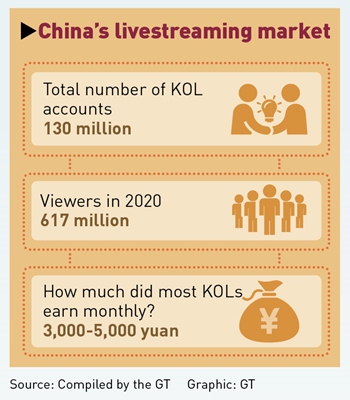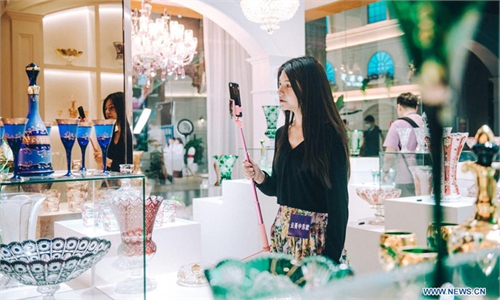New reality for Chinese livestreaming
Industry expected to reshuffle following tightening regulation

File photo: VCG
Having stepped into the short-video and livestream sector - widely viewed at the hottest form of social media over recent years - Liu Xingliang, an internet and technology industry key opinion leader (KOL), has garnered more than 200,000 followers. He is optimistic about the bright future of China's burgeoning livestream business despite recent tightening regulation targeting widespread tax avoidance.
"Looking deep into the industry, you could find that some loopholes have existed for a long time," Liu said, recalling his experience four or five years ago when he was advised to avoid paying personal income tax, which can go as high as 45 percent, and instead, pay the rate of a privately owned company, which typically falls under 6 percent.
"The rate was tempting, to be frank, but I knew the hidden taxes would be exposed one day, so I refused immediately," Liu told the Global Times on Monday.
Earlier this month, China's top livestreamer Huang Wei, nicknamed Viya, was fined 1.34 billion yuan ($210 million) for dodging taxes by local authorities in Hangzhou, capital of East China's Zhejiang Province, an e-commerce hub, and home to China's e-commerce giant Alibaba.
Viya evaded a total of 643 million yuan in taxes in addition to 60 million yuan of other underpayments between 2019 and 2020 by concealing her personal income along with other false tax declarations.
Known as the "livestream queen," who sold 8.5-billion-yuan worth of goods in a 14-hour livestreaming session on the first night of the Double 11 (November 11) shopping festival on October 20, Viya's hit with such a harsh penalty prompted the entire livestream industry to move to adjust business practices.
Mogujie.com, one of China's biggest fashion-focused e-commerce services, has recently decided to cut 30 percent of its employees, with the technology department having the highest proportion of layoffs reaching about 80 percent, according to a report by Yicai.com.
In July 2019, Mogujie.com announced that it would "fully embrace the livestream business," which contributed more than 90 percent of the platform's total gross merchandise volume (GMV), according to its quarterly earnings report through to June 30.
Another top influencer in the livestream e-commerce sector, Zhu Chenhui, known online as Xueli Cherie, is reportedly busy clearing her company's inventory at prices no more than 1,000 yuan via offline channels.
Xueli has not returned to livestreaming after being slapped with a tax evasion fine in November. Her Taobao shop was also shuttered shortly afterward.
Top influencers under radar
The livestreaming ecosystem is mainly composed of brand merchants seeking to promote their products, livestreamers, and platforms that provide technology support. Over recent years, the livestream business model has become more mature and was proving to be quite resilient, but the Viya penalty has shaken top influencers, Liu said. "They can no longer enjoy the wild money-making mode as comfortably as before. The industry reshuffle will benefit the supply side," he noted.
Top influencers have huge resources at their disposal, thus squeezing the space available for small and medium-sized hosts, they usually gain the upper hand when bargaining with brands based on their tremendous traffic.
Li Jiaqi, the livestream salesman going head-to-head with Viya, was among multiple influencers and five major platforms, including Taobao, summoned by the Zhejiang Consumers Council on Thursday to address a number of unregulated practices.
The council conducted a review of livestream marketing activities on Taobao, Pinduoduo, JD.com, Kuaishou and Douyin, as well as 17 influencers during this year's Double 11 shopping festival. The results of the probe revealed that five of the influencers had engaged in exaggerated promotion.
Looking through the spotlight generated by top influencers, Chinese consumers, who have become, in some cases, "addicted" to livestream shopping during the pandemic, will not abandon this new way to purchase goods, instead, they will focus more on products, and their acceptance of less famous hosts will also increase, industry analysts have claimed.
Wang Fengqing, a livestreamer who sells hanfu, the traditional garment of China's Han ethnic group, on Kuaishou, said the tightening industry regulation following the top influencers' tax event will not affect the business of small hosts like him.
"I have more than 80,000 followers now and I only focus on selling Hanfu, which is quite a vertical mode, so my audience is relatively stable," he told the Global Times, believing that the livestream industry will only grow better and better after clearing away the chaos.

Graphic: GT
An industry insider, who asked to remain anonymous, told the Global Times that the era of a livestream industry marked by internet celebrities and wild growth without sufficient regulation has ended, and the industry will embrace fairer competition."Apart from the blow to top influencers, a group of multi-channel network (MCN) companies will also be affected," the insider said.
The whole industry landscape is more complicated than a livestreaming studio. Behind the momentum of China's short-video players and livestream commerce businesses are the pushing hands of MCNs - companies that provide live commerce services including introducing influencers, creating and planning content, and expanding audience sizes.
The livestream commerce market in China doubled from 2019 to 900 billion yuan by the end of 2020. The number of users on livestreaming platforms reached 617 million last year, accounting for 62.4 percent of the total number of internet users in China, while the number of livestreamers exceeded 130 million, according to an industry report.


